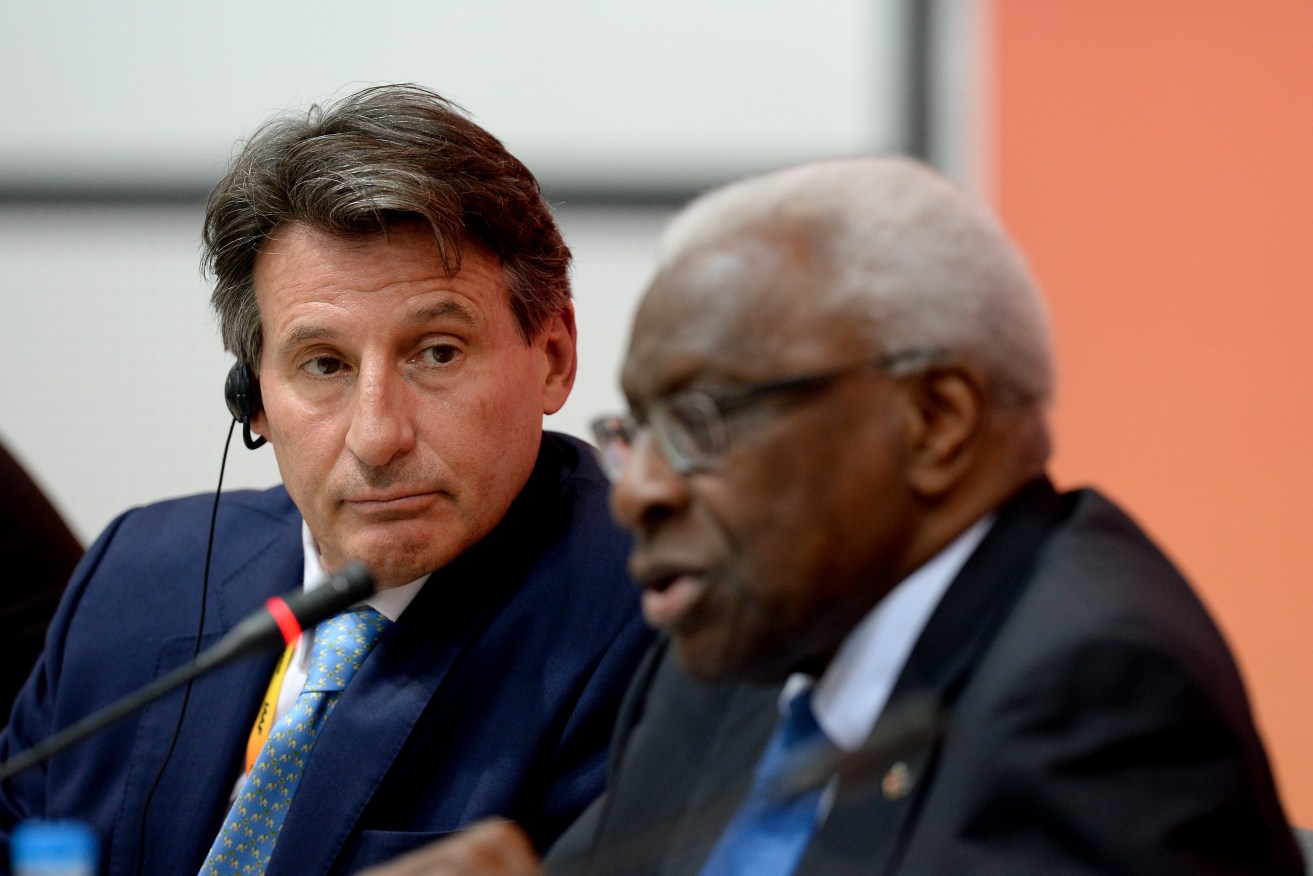World athletics admits “extreme gravity” of WADA findings
The International Athletics Federation, “fully acknowledges and accepts the extreme gravity” of the findings of the WADA independent commission after athletics’ world governing body was hammered for weak governance that allowed widespread corruption.

IAAF president Sebastien Coe with his now-disgraced predecessor Lamine Diack last year. Photo: Martin Rickett, PA Wire.
The IAAF said in a statement that the weakness of its governance “had allowed individuals at the head of the previous regime to delay the following of normal procedures in certain doping cases”.
It said that the commission’s recommendations, in the report carried out by former WADA chief Dick Pound, to strengthen governance would be incorporated “into the root and branch review which was begun by IAAF President Sebastian Coe immediately he came into office”.
The WADA commission exposed the corrupt regime of former president Lamine Diack and said knowledge of it must have been widespread among senior figures of the Monaco-based federation.
Coe accepted that the organisation’s Council, of which he was a long-standing member, should have been aware of the corruption and told Reuters he would introduce reforms to ensure there would be no repeat.
“I will put systems in place for the current council and so that my successor is never in a position that we don’t understand the nature of the day-to-day running of the organisation,” Coe said after Pound had said he felt the Briton was the right man to lead the IAAF.
“We cannot change the past, but I am determined that we will learn from it and will not repeat its mistakes,” he added.
American track and field (USATF) President and IAAF Council member Stephanie Hightower said she was “disturbed” by the report but also gave backing to Coe.
“I agree with Mr Pound that President Sebastian Coe is the person to lead the sport into a new era and put these types of allegations in our past, not our future,” said Hightower.
“It has been clear, since allegations first started to be made public, that the governance of the IAAF must change to become more transparent in order to ensure accountability and credibility.”
Former Russian athletics chief Valentin Balakhnichev, who was heavily criticised in the report and was banned for life for corruption and blackmail last week, gave the report little credence.
“I have no hope of receiving a fair decision or any serious proof from WADA or the IAAF ethics committee,” Balakhnichev was quoted as saying by R-Sport news agency.
“I am disappointed in these people who cannot prove anything.”
Russian Sports Minister Vitaly Mutko also told R-Sport: “This document is mainly about corruption in the IAAF, it does not particularly concern Russia.
“Accusations against Balakhnichev are not a problem for Russia, they are a problem for the IAAF. We cannot interfere in the activities of an international federation.”
Russia remains suspended from international athletics following the revelations of the first part of the WADA commission report in November.
However, a former Russian Anti-Doping Agency official told Canadian media WADA was aware of systematic doping in the Eastern European country for years but did nothing until a documentary jolted the agency into action.
Vitaly Stepanov and wife Yuliya, an international runner who was banned for doping, were the whistleblowers who provided key evidence for a German television documentary that led to the establishment of a WADA independent commission.
Now in hiding, Vitaly told the Canadian Broadcasting Corp (CBC) in an interview that aired on Wednesday that in 2010 he secretly began sending details to WADA about how Russia’s doping system functioned.
With no action being taken by WADA, Vitaly said he was told by an unnamed official at the agency that the best advice he could provide was to go to the media.
“Of course both of us were frustrated at some point because we just didn’t know if anything was happening, like even at WADA there were people who did not want this story to get out,” Stepanov told CBC.
WADA did not immediately respond to a request for comment.
Vitaly’s frustration reached a boiling point in 2013 when he says his wife was used as pawn and returned a positive test so the Russian anti-doping agency would appear to be doing its job.
Soon afterward Yuliya came clean in a letter to WADA outlining everything she took and how and whose direction. As the CBC said, “she named names.”
On the advice of the WADA official, Vitaly and Yuliya contacted the German journalist who was working on the documentary called, “Top Secret Doping: How Russia Makes Its Winners.”
That explosive expose appeared to force WADA’s hand, the anti-doping agency announcing weeks later that it had called for an independent commission headed by former WADA chief Dick Pound to investigate the claims.
Branded as traitors at home, Vitaly, Yuliya and their young son have been on the run since the documentary aired in December 2014. They have changed residences nine times and are living under assumed names.
Yuliya told the CBC that not even their families know their whereabouts.
There was no indication on where the couple are currently hiding, saying only that they had not sought asylum in Canada as first rumoured.
“There is no anti-doping movement in athletics, in Russia it is the completely opposite it is a doping movement and everyone around you says that is the only way to succeed, if you dope and you lie about it,” said Vitaly.
-Mitch Phillips & Steve Keating, Reuters




